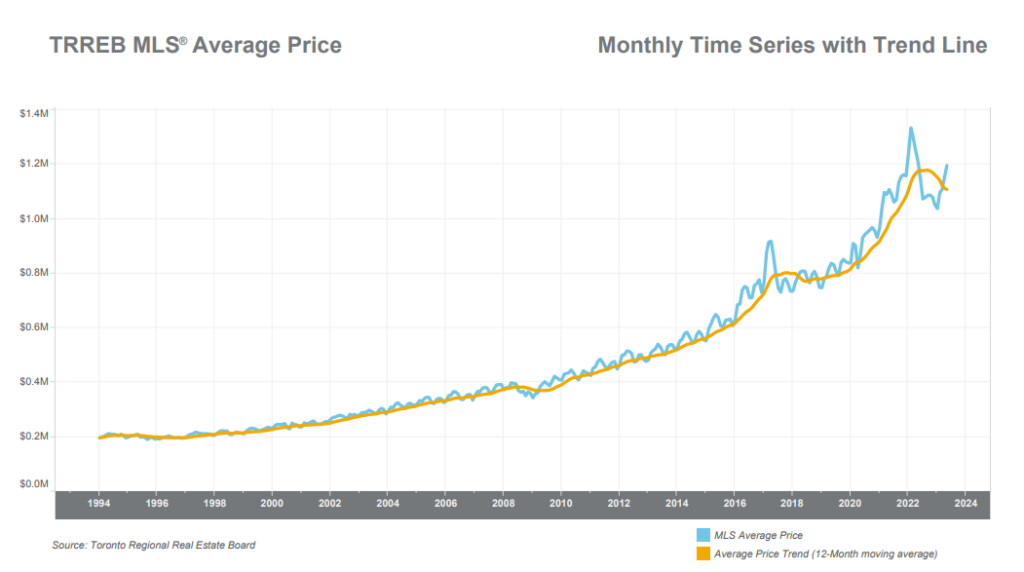Canada real estate market outlook 2023
You may have heard there’s something of a housing crisis in Canada. Canada currently has the least affordable housing market in the G7, which has been great news if you already own property, and less so if you were planning on becoming a first time buyer in the future. With that being said, prices have decreased over the past year, and Canada is one of the best countries in the world to live in, so it’s no surprise that buying a home is still a goal for many.
Let’s take a look at what factors are impacting the market and how prices have done over the past year in key areas.
Here’s your outlook on the Canadian housing market for 2023.
How the mortgage market impacts housing prices
In the past year the Bank of Canada has increased rates to their highest level in 22 years. The Bank of Canada’s goal is to reduce inflation by curbing demand through a higher cost of borrowing. When the Bank of Canada raises interest rates, mortgages become more expensive, leading to decreased demand, which in turn reduces the price of homes.
The Bank of Canada raised rates again in June 2023 after a brief pause from the last rate hike which came in January. While interest rates may continue to rise in the short term, analysts are in agreement that when inflation is brought under control the Bank of Canada will likely start to consider lowering rates again in the future.
Check out our interest rate forecast for more information on where interest rates are likely to go.
Supply and demand
The price of housing in Canada is primarily impacted by the two fundamental forces of economics: supply and demand. When the price of housing is on the rise, we can assume that demand is outpacing the new supply of homes. Both supply and demand are impacted by a number of factors, for example demand for housing increases with population, but it also increases as the cost of borrowing lowers, as more people can afford a larger mortgage.
Canada’s population has been on the rise for many years, with most newcomers to Canada settling in major city centers like the Greater Toronto Area (GTA) and the Greater Vancouver Area (GVA). These cities are popular due to their infrastructure, diversity, job market, and more, which makes it no surprise that demand is highest in these areas. As a result the cost of housing in Toronto and Vancouver is much higher than other areas in Canada. The further away from major city centers you go, the cheaper the price of housing is, due to lower demand.
Recommended reading: How population affects the housing market.
On the supply side, it can be slow to build new housing, with contractual issues, and a lack of trade workers. Ontario in particular has been said to be in a draught of skilled trade workers, which has led to some analysts warning that it’s currently not possible to build enough homes at our current rate to increase housing affordability.
Where is the real estate market headed in the future?
While prices are down in the short-term, even in major city centers like Toronto and Vancouver, they haven't yet fallen to pre-pandemic highs. The current dip in the market is likely caused by decreased demand due to interest rate hikes from the Bank of Canada. In the long term the CMHC is predicting that prices will start to increase again in 2024 when inflation is brought under control. Our forecast for Canada's real estate market as a whole is that due to the collective forces of increasing demand and a lack of supply, the average price of a home in Canada will continue it's long term trend upwards.

The housing market in Toronto and Vancouver
Toronto and Vancouver with their respective larger metropolitan areas, are the two most densely populated areas in Canada. With the demand for living in these cities higher than anywhere else in the country, it’s no surprise that the benchmark price of a home is also a league above that of elsewhere. At the same time, with interest rates on the rise, and the cost of a mortgage becoming more expensive, the prices in these areas have decreased the most compared to other cities.
In Toronto the average home price was down 7.8% from 2022 to 2023 according to TRREB, the Toronto Regional Real Estate Board. However looking at the trend line, it seems that prices have already started to rebound while the Bank of Canada paused their rate hikes. While prices may still have more to fall in the short term, in the long term the trend is clear, and when the Bank of Canada stops raising rates it seems clear that it will continue.

According to a report by Scotiabank, Ontario has the largest housing deficit in Canada, with less housing per capita than any other province in the country. In order to make up the deficit, the report says, Ontario would need to build a surplus of 650,000 homes just to bring it to the same level as the rest of Canada. With that being said in 2022 new housing starts in Ontario were just 96,080 well below the target needed to alleviate the province’s high housing prices according to analysts. What’s worse is that new starts have been trending downward in recent months in part due to a lack of trade workers and contract issues.

Vancouver has seen a similar trend, with prices rebounding in May, despite being down 5.60% year over year in May of 2023.
Some Canadians are flocking to lower-cost of living areas
While the most expensive markets such as the GTA and GVA have seen a decrease in prices over the past year, other areas have remained stable or even increased as some Canadians have elected to move to lower cost of living areas.
Calgary in particular has seen an increasingly hot housing market with new buyers rapidly outpacing listings. According to the Calgary Real Estate Board the average price of a home increased 7.37% from $512,060 in June of 2022, to $549,790 in June of 2023. This gain was led by detached homes, which were 9.29% more expensive than last year.
Rental prices are also up across the board in the city, as the cost of housing rises.
It’s clear that even with interest rates on the rise, a lack of supply is leading to hot markets in some areas.
Speaking with our realtor partners in Alberta, they’ve seen the seller’s market come about due to an increase of inter-provincial migration, with many buyers moving from Ontario to Alberta in search of a more affordable market.
Compare thousands of mortgage offers in less than a minute
2023 Real Estate Outlook by City
Toronto, ON real estate market outlook 2023
North York, ON real estate market outlook 2023
Edmonton, AB real estate market outlook 2023
Brampton, ON real estate market outlook 2023
Windsor, ON real estate market outlook 2023
Hamilton, ON real estate market outlook 2023
Oakville, ON real estate market outlook 2023
Burlington, ON real estate market outlook 2023






